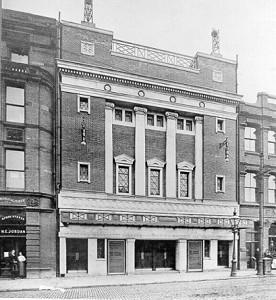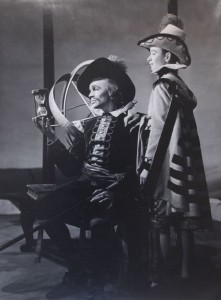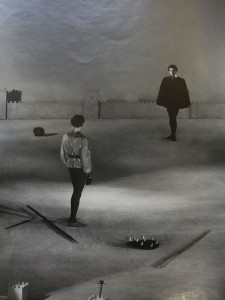This year the Birmingham Repertory Theatre celebrates its centenary, and over the weekend of 23 and 24 March there is to be a series of talks, discussions and an exhibition to be held at the original theatre in Station Street.
Birmingham Repertory Theatre was founded by Barry Jackson, who over several decades poured much of his substantial income, the result of his father’s successful grocery business, into it. His financial independence meant that he could experiment, and the result was that the Birmingham Rep gained a name for innovation and exciting theatre. His modern dress Shakespeare productions proved not all the most interesting developments happened in London.
On the first day of the weekend there will be a focus on Barry Jackson, led by a keynote address by John Harrison, who as a young actor worked with Jackson at the Rep and then in Stratford. I’m excited to be taking part in the discussion led by playwright David Edgar about Jackson’s work in Birmingham, Malvern and Stratford, where Jackson was Director of the Festivals from 1946-1948. A timetable for the weekend is to be found at the end of this post.
Jackson had been a Governor of the Shakespeare Memorial Theatre since 1929. During the War the theatre in Stratford had been surprisingly financially successful, managing to remain open as usual despite considerable difficulties such as restrictions on travel, the impossibility of casting and retaining young actors, and the availability of fabrics for costumes. There had been no new developments: each year about eight productions were put on, over a season of six months. The Director concerned himself mainly with the actual productions, in 1945 Robert Atkins directing all the plays himself.
The war in Europe had come to a close in May 1945, and by the end of August all hostilities had ceased. The newspaper reports detailing the end of the Theatre season in September were full of phrases like “the end of a chapter” and “great hopes for the future”. Barry Jackson took over the running of the theatre almost immediately, in October 1945.
He took over a theatre building much in need of investment, and a festival which needed, artistically, an injection of new thinking. Allowed more control over the building itself he spent money on upgrading facilities such as machinery and improving dressing rooms. The Governors had been notoriously stingy: there were assets of £190,000 in the bank, explained by Lord Iliffe, the Chairman of the Governors as money to be used in promoting the theatre after the war.
 Jackson promised to balance new thinking against tradition. At the end of his first season, in spite of full houses, there was a deficit, mostly caused by spending money on those behind the scene improvements. Having propped up Birmingham Repertory Theatre using his own money for many years he was not disturbed, though some of the Governors were horrified. More difficult for Jackson was his deteriorating relationship with Fordham Flower, who actually ran the theatre.
Jackson promised to balance new thinking against tradition. At the end of his first season, in spite of full houses, there was a deficit, mostly caused by spending money on those behind the scene improvements. Having propped up Birmingham Repertory Theatre using his own money for many years he was not disturbed, though some of the Governors were horrified. More difficult for Jackson was his deteriorating relationship with Fordham Flower, who actually ran the theatre.
Jackson could be distant: the photograph widely circulated of him showed him seated in the theatre’s library reading its copy of the First Folio. This academic manner, combined with his homosexuality, (never of course publicly discussed), did not go down well with Flower. He refused to live in Stratford, staying in Malvern, and did not join in the numerous social events which had endeared some of his predecessors to local people and organisations.
Artistically, his years were undoubtedly successful. Although in the early years of the 1932 building there were signs of experimentation, during the war the Memorial Theatre had got into a rut from which it needed to be shaken. Jackson shared the ambition for Stratford to become the best venue for Shakespeare in performance nationally and internationally, proclaiming on 22 January 1946 “youth is the theme for the next Shakespearian season”. Sure enough he brought in a host of talented and mostly young actors and directors who brought the theatre to national attention. Two of these were the 20-year old Peter Brook and the young actor Paul Scofield. Each production was directed by a different person, the 66 year-old Jackson keeping in the background by not directing a single one. Brook’s productions of Love’s Labour’s Lost and Romeo and Juliet, both featuring Scofield, were controversial but essential viewing.
To his disappointment, his three-year tenure was not extended, and he was replaced by a man of very different character, Anthony Quayle, a family man with a background that combined the military and the theatrical, an easy manner and contacts throughout the theatre world. Quayle’s directorship, still remembered positively, was much more conservative than Jackson’s, but it was Jackson who laid the foundation for the creation of the Royal Shakespeare Company.
Find out more about Barry Jackson and his work at the Rep 100 Weekender:
| EP100 Weekender23 & 24 March 2013 | |||
| Saturday 23 March: “Station Street to Stratford via Malvern”10:00am Keynote speech by John Harrison on his experiences working with Sir Barry Jackson, Paul Scofield and Peter Brook, both at Birmingham Repertory Theatre and Stratford in the 1940s, and also his time as Artistic Director of Birmingham Repertory Theatre in the 1960s11:15am Playwright David Edgar and guests discuss Sir Barry Jackson’s work in Birmingham, Malvern and Stratford. 2:00pm A showing of The Quiet Pioneer – the acclaimed documentary film about Sir Barry Jackson’s career. 2:30pm REP100 curator Gwendolen Whitaker presents items from archive which tell the fascinating story of The REP. 4:00pm The REP’s new Artistic Director, Roxana Silbert discusses re-imagining classics from the first modern dress Shakespeare production in 1923 to The REP’s new Sixties-set production of Hedda Gabler, with writer Robin French and designers Pamela Howard, Ruari Murchison and Jamie Vartan. Sunday 24 March: “Drama Queens” 10:00am Meera Syal discusses her work in theatre. 11:00am Professor Claire Cochrane leads an all-female panel of celebrated writers, including Bryony Lavery, Gurpreet Bhatti and Rachel Delahay. 1.30pm Janet Suzman leads an all-female panel of actors, including Lorna Laidlaw, Shelley King and Elisabeth Hopper. 2.45pm Roxana Silbert leads a discussion on the role of women in theatre today and historically with Kate Horton, Gwenda Hughes, Pamela Howard, Janet Suzman, Vikki Heywood, Kate Organ and Elizabeth Freestone. Special offer
|
|||




